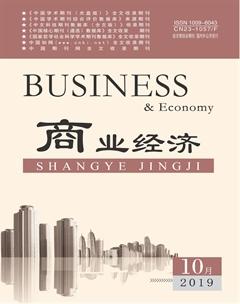新时代“苏商文化”融入高职高专思政课研究
阚国坤 柴义江
[摘 要] 新时代高职高专在不断探索“思政课程”与“课程思政”协同创新过程中,将中华传统文化重要内容的商业文化融入思政课,以期实现思政课程立德树人建设的现实追求。在分析苏商文化精神内涵特征基础上、探讨融入思政课内容、意义价值及实现路径,充分发挥产业(行业)文化培养大学生职业精神素养优势,试图解决思政教育与专业教育内容上“两张皮”问题,通过以文化人、以文育人,探索打造全员全过程全方位培养大学生具有“工匠精神”等充满文化自信的社会主义建设者的金课。
[关键词] 苏商文化;思政课;融通;高职高专
[中图分类号] G711[文献标识码] A[文章编号] 1009-6043(2019)10-0183-04
Abstract: In the new era, higher vocational colleges are constantly exploring the collaborative innovation process of "ideological and political course" and "ideological and political theories teaching in all courses", integrating the commercial culture of the important content of traditional Chinese culture into the ideological and political course, in order to realize the realistic pursuit of ideological and political course construction. Based on the analysis of the connotation and characteristics of the cultural spirit of businessmen from Jiangsu, this paper explores the content, significance, value and realization path of integration the culture into the ideological and political course, gives full play to the advantages of industrial (industrial) culture in cultivating college students' professional spiritual accomplishment, and tries to solve the "two skins" problem in the content of ideological and political education and professional education. Through the way of educating people with culture, it tries to design top quality courses by cultivating college students' to be socialist builders with cultural self-confidence such as craftsman spirit in an all-round way in the whole process.
Key words: culture of Jiangsu Businessmen, ideological and political course, integration, higher vocational colleges
在經济全球化、互联网技术飞速发展的新时代,我国愈加重视打造中华民族实现中国梦的亲商重商环境,也使得新商业文化渐趋成为我国社会的主流文化之一。作为高职高专必修课思政课,“是落实立德树人根本任务的关键课程。”在推进“思政课程”与“课程思政”协同创新过程中,诸多高职院校探索将中华优秀传统商业(产业)文化融入课程思政中,将思政课打造成为接地气、有温度、学生喜爱的金课实践。而江苏高职高专积极探索将“苏商文化”融入思政课的实践,借以传播苏商文化及企业家精神而实现立德树人的成效,培育为高质量发展新江苏需求的时代新人。
一、苏商文化内涵及精神
就中国商业文化发展史来看,“苏商”作为一个区域政治和文化群体,更作为一个工商业群体,则通常有广、狭义之谓。广义“苏商”指古往今来所有在江苏省域范围内投资、创业以及在省外、境外投资的江苏籍工商人士;狭义“苏商”单指苏州府的商人。苏商作为我国商业发展史上发挥巨大作用的著名商帮,仅明清时期就曾在苏州西南太湖边上将货物销往全国各地,在近代上海滩创造了一个巨大的金融神话。[1]自1978年改革开放以来伴随着市场经济大潮,崭新一代的苏商群体迅速崛起,成为响应政府发展经济大规模招商引资背景下,众多省份招商引资的首选。而江苏地级市按辖区又自名“宁商”“吴商”“锡商”“扬商”“通商”“淮商”“徐商”“宿商”等,借以打造城市名片,体现了致力营造重视商业文化、注重企业家精神的重商文化环境,使得“苏商”成为当代中国商帮中颇具特色标识之一,促成了“苏商”成为影响中华商界(华商)的一支劲旅。
而正是这些崛起于“苏湖熟,天下足”鱼米之乡大地上的古今江苏商人,汲取了山水之灵气、秉承勤劳古风的发达农耕文明基础上形成的区域商业文化,创造了体现江苏商业文化传统、精神理念、价值理念,熔铸成了积累具有地域特色的苏商文化内涵。体现在古代苏商精神是强调重义轻利、柔和包容、绅商相通、自给自足;近代苏商代表的是“开拓创新、敢为人先、爱国报国、诚信经营、义利结合、团结合作、反哺社会”等精神。现代苏商精神是专注稳健、扎根实业、重抓创新、以人为本。新苏商形成“敬业、诚信、儒雅、稳健、创新”苏商文化精神。概而言之,苏商文化核心内涵是“爱国尚德、稳健务实、开拓创新、敢为人先,开放包容、睿智敏行,诚信经营、崇文惠民”精神。

